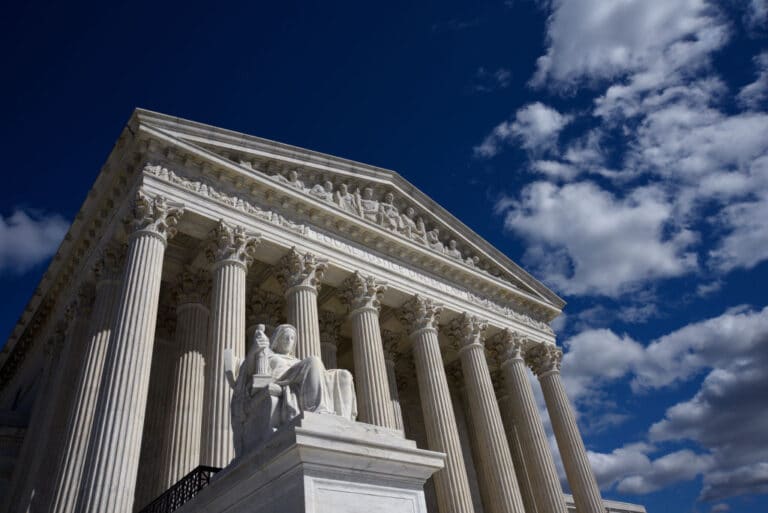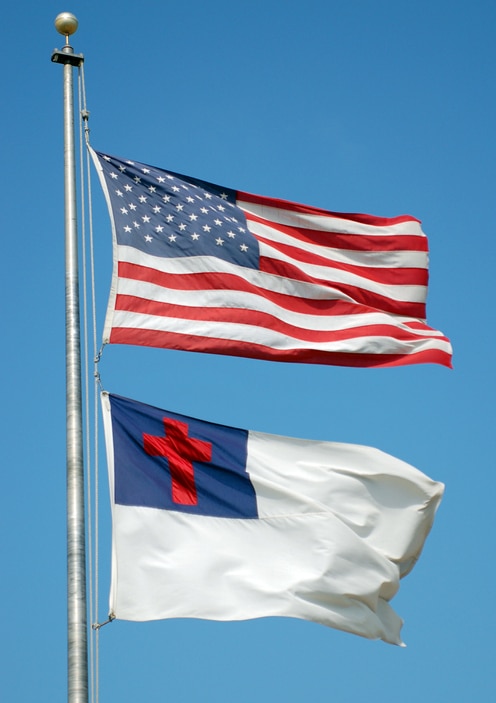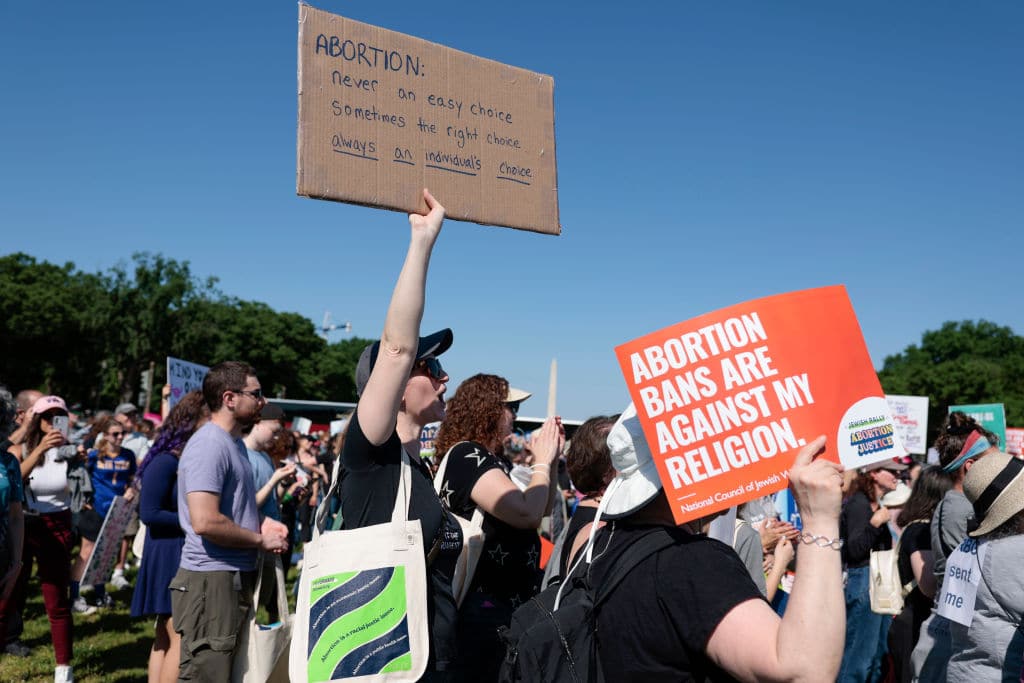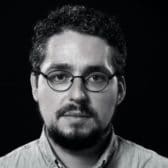
Four recent rulings by the Supreme Court have changed religious life in America and legal experts are weighing in on their potential impact.
Marc Stern, chief legal officer at the American Jewish Committee, told Haaretz the recent court rulings “confine the Constitution to an 18th-century America. The Constitution should not change with every new trend, but neither can it sensibly be read without regard to massive change in American life.”
Here’s a look at the rulings and how they could possibly affect Jewish life in America.
Raising Christian flags at government buildings

In Shurtleff v. Boston the Supreme Court unanimously ruled that a Christian flag can be raised outside Boston’s City Hall.
Justice Stephen Breyer wrote that the court found that the city discriminated against a Christian activist’s religious viewpoint. The activist applied to include the Christian flag in a city program that allowed citizens to submit flags to be raised outside of City Hall. Breyer argued that the city of Boston did not actually control the messages of the flags and because of this the flag raisings were not government speech but private speech which cannot be regulated by the government.
Justices Neil Gorsuch and Brett Kavanaugh each wrote separate opinions indicating that the ruling didn’t go far enough. The Gorsuch opinion, which Justice Clarence Thomas signed on to, calls for the end of using the judicial test known as the Lemon Test.
The Lemon test was established by the Supreme Court ruling in Lemon v. Kurtzman. The ruling created a formal way to limit government endorsement of religion by introducing three tests to determine whether the government’s treatment of a religious institution constitutes the “establishment of a religion” which is prohibited under the establishment clause of the First Amendment.
Under Lemon, all laws must:
- Have a “secular legislative purpose”
- Not advance or inhibit religion
- Not foster an excessive “entanglement with religion”
The test “produced only chaos,” Gorsuch wrote in his separate opinion.
“The conservative-majority U.S. Supreme Court has chipped away at the wall separating church and state in a series of new rulings, eroding American legal traditions intended to prevent government officials from promoting any particular faith,” wrote Reuters Legal Affairs Correspondent Lawrence Hurley in an article including the case.
Public funding for religious schools

In Carson v. Makin the Supreme Court ruled 6-3 that Maine’s exclusion of faith-based schools from a tuition-assistance program in districts without a high school violated the First Amendment’s Free Exercise Clause.
According to USCourts.gov: “The Free Exercise Clause protects citizens’ right to practice their religion as they please, so long as the practice does not run afoul of a ‘public morals’ or a ‘compelling’ governmental interest.”
The Union of Orthodox Jewish Congregations of America and the Council of Islamic Schools in North America filed an amicus brief in support of the case. Both organizations favor the use of vouchers to fund private schools.
“All parents and families should have the right to make the best choice for their children’s education,” Orthodox Union President Mark Bane said in a statement after the ruling. “By participating in this case, the Orthodox Union hopes to protect all families against institutional, anti-faith discrimination not just in Maine and not only in school funding programs, but in all states and programs that attempt to favor secularism to the exclusion of faith.”
Meanwhile, the Anti-Defamation League filed a friend of the court brief in support of Maine calling the case “an unwarranted and substantial expansion of the Free Exercise Clause contrary to the Court’s existing precedent.”
The court’s two Jewish justices, Elena Kagan and Stephen Breyer, were in the dissenting minority. Breyer, who wrote the dissenting opinion, said that the ruling could open the door to broader public funding of religious schools.
“Does that transformation mean that a school district that pays for public schools must pay equivalent funds to parents who wish to send their children to religious schools?” Breyer wrote. “Does it mean that school districts that give vouchers for use at charter schools must pay equivalent funds to parents who wish to give their children a religious education?”
Abortion

There is one thing that halachic authorities unanimously agree on: the life of the mother takes precedence over the life of the fetus until the moment of birth. In fact, when the mother’s life is threatened, halacha requires the woman to abort the fetus and save the life of the mother.
Jewish law also recognizes the mother’s mental health and psychological state in evaluating the threat the fetus or child poses to her, and rabbinic scholars have debated the degree of mental distress and anguish that must be present to justify terminating the pregnancy.
In a statement the Orthodox Union said:
“We cannot support absolute bans on abortion—at any time point in a pregnancy—that would not allow access to abortion in lifesaving situations. Similarly, we cannot support legislation that does not limit abortion to situations in which medical (including mental health) professionals affirm that carrying the pregnancy to term poses real risk to the life of the mother.”
Rabbi Moshe Hauer, the Orthodox Union’s executive vice president, expressed concern in an interview with the JTA over states that exclude mental health as a reason for having an abortion.
“Absolutely, when there will be mental health issues that impact the life of the mother abortion should be allowed, and, yes, in that event, we would we would be concerned about that,” he said.
Currently, Georgia’s abortion ban does not include mental health exclusions.
Christian prayer at public schools

Kennedy v. Bremerton School District significantly expanded the place of religion in public American life. In its 6-3 ruling, the Supreme Court said that a public school unfairly fired its high school football coach for hosting prayer sessions on the 50 yard line after games.
“The Constitution and the best of our traditions counsel mutual respect and tolerance, not censorship and suppression, for religious and nonreligious views alike,” Justice Neil Gorsuch wrote in the majority opinion.
“Respect for religious expressions is indispensable to life in a free and diverse republic — whether those expressions take place in a sanctuary or on a field, and whether they manifest through the spoken word or a bowed head,” he added.
Legal scholars say the decision lowers the bar between church and state in an opinion that will allow more religious expression in public spaces.
Writing for the opposition, Justice Sonia Sotomayor wrote that the ruling prioritizes the religious rights of a school official over the rights of students, adding that students could feel pressured to take part in religious activities.
“In doing so,” Sotomayor wrote, “the court sets us further down a perilous path in forcing states to entangle themselves with religion, with all of our rights hanging in the balance.”
Jews who went to public school or have children in public school, if you're comfortable, reply to this sharing a time you had someone else's religion imposed on you through "secular" public schools.
— Alex (@JewishWonk) June 27, 2022
This sentiment was echoed on social media by Jewish Americans who shared how prevalent Christian prayer and other activities were in their public schools. Most recently a Jewish student in West Virginia was forced to attend a prayer meeting during school hours.
